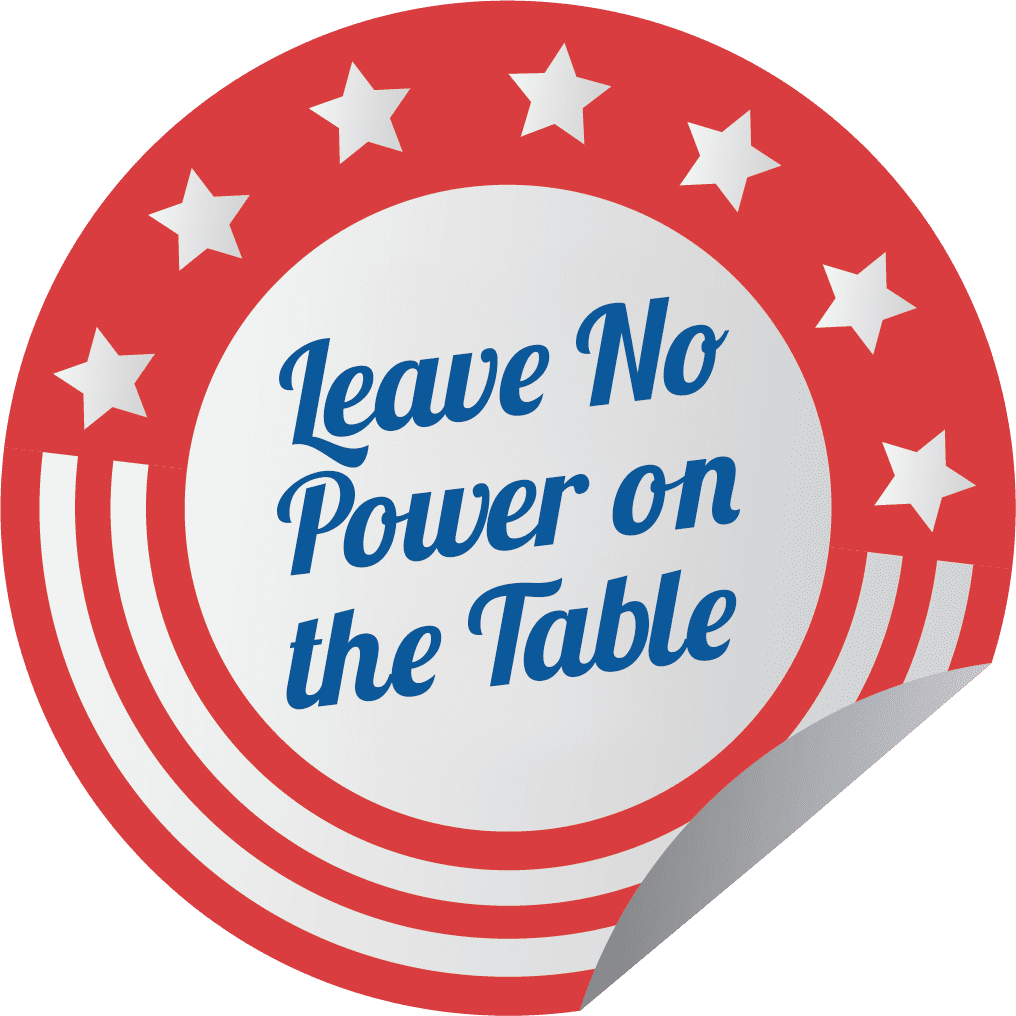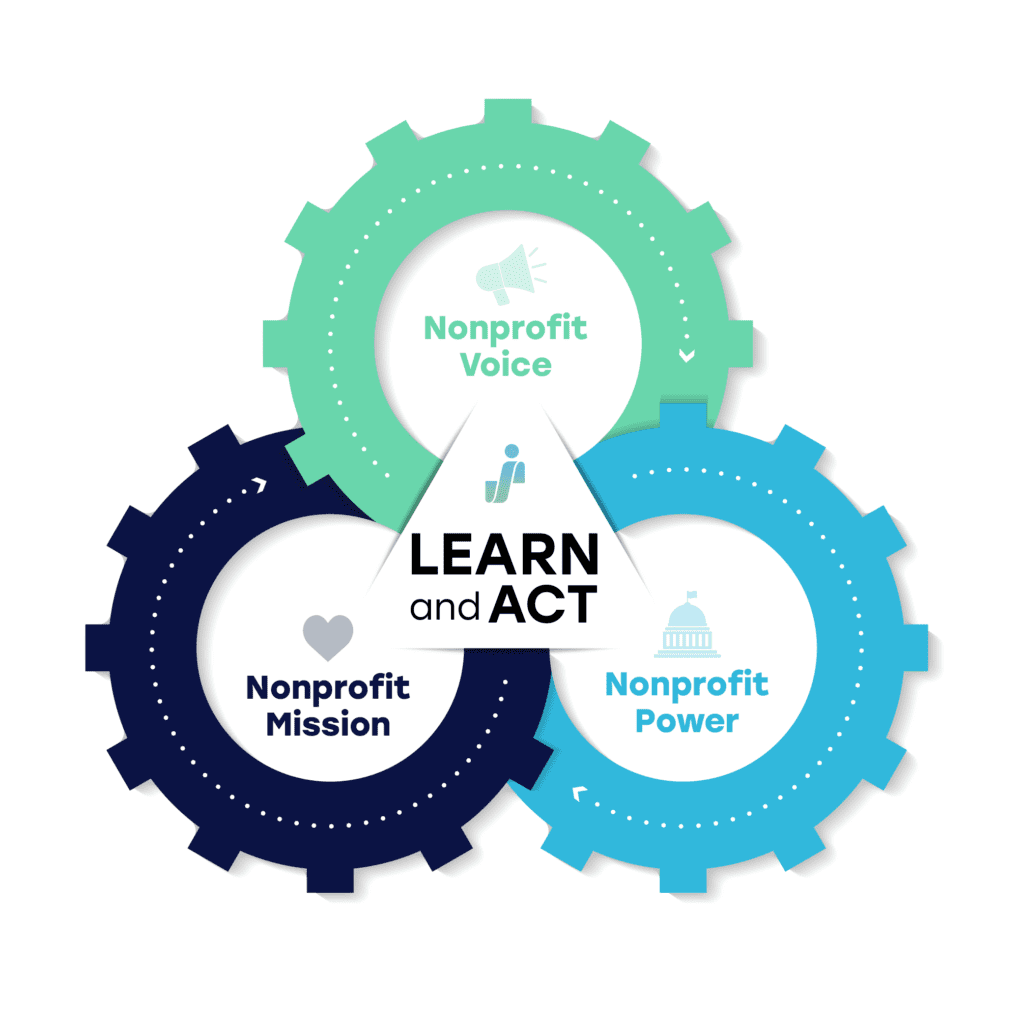Leave No Power on the Table Pledge
Connecting Nonprofit Mission to Civic Engagement and Advocacy
The Leave No Power on the Table initiative is an educational series and nonpartisan pledge campaign that equips nonprofits with the resources and support they need to strengthen their influence and better serve their constituents through advocacy, civic engagement, and voter participation.
Why Should Nonprofits Promote Civic Participation and Engagement?
The answer is simple. Systemic problems require systemic change. But nonprofits can’t change systems without advocacy. Unfortunately, fewer than half of all nonprofits believe that policy advocacy relates to their mission, and fewer than a third of nonprofits report engaging in advocacy in the last five years, according to Independent Sector research.
When nonprofits don’t advocate — or provide our constituents with the civic tools they need to advocate — we miss vital opportunities to better serve our communities through policy solutions.
Democracy works best when all nonprofits across all sectors and missions work to expand and protect it. By promoting civic engagement, advocacy, and voter participation, nonprofits can amplify the voices of those we serve to advance meaningful change. It’s on Us to ensure the promise of fair and equal participation is afforded to every nonprofit constituent.

Take Back Your Power
Nonprofit voter and civic engagement increase nonprofits’ relevance both during and after elections, enabling us to participate in critical public policy discussions that inform nonprofit issues. But when nonprofits exclude advocacy and civic engagement from their agendas, our missions, interests, and constituencies are left without a voice in decision-making processes.
We can no longer leave power on the table by ignoring our responsibility to serve as community advocates. Make a commitment by taking the pledge to advance your organization’s mission and the sector’s collective impact and put power back in the hands of the communities we serve. Review the pledge commitments to get started.
Learn and Act: Harnessing the Three Levers of Power
The powers that be are keenly aware that nonprofits yield significant influence. They just hope we never learn how to use it. Leave No Power on the Table is an educational series and nonpartisan pledge campaign that helps nonprofits with all levels of experience amplify their influence and maximize their impact through three levers to advance systems–level change — nonprofit mission, nonprofit voice, and nonprofit power. Learn about each lever through the following learning modules and resource collections.
Note: Educational materials and capacity–building resources for each module will be published regularly.

Module 1: Nonprofit Voice
Empowering Nonprofit Communities Through Civic and Participatory Processes
Nonprofit advocacy is a catalyst for systems-level change. By empowering our communities to actively participate in the democratic process, we not only strengthen our influence but also promote electoral accountability.
This learning module offers practical guidance to help nonprofits bring underrepresented voices to the decision-making process through nonpartisan voter engagement and voter education initiatives.
Module 2: Nonprofit Mission
Leveraging Power Through Purpose
Mission alignment is the single most powerful indicator of whether a nonprofit will engage in advocacy, according to recent research. By advocating for policies related to our missions, nonprofits can address the root causes of our constituents’ issues and effect systemic change.
In this learning module, you’ll explore case studies and insights from leading advocates that illustrate “why” civic engagement and “how” issue advocacy are integral to the mission and operations of every nonprofit.
Module 3: Nonprofit Power
Securing Nonprofits’ Seat at the Decision-Making Table
The nonprofit sector has long served as the bridge between government and community — a role that has powerfully shaped civil society. Despite our scale, expertise, and significant economic contributions, nonprofits are often on the “outside looking in” when public policies are decided.
Candidates and incumbents for elected office are more inclined to engage communities with high voter participation rates. When the communities we serve participate in democratic processes, policymakers are more likely to prioritize their needs and the policy priorities of the organizations that serve them.
This learning module includes a collection of resources that will equip you with high-impact strategies to leverage your organization’s power, demonstrate your impact and expertise, and engage directly with policymakers year-round.